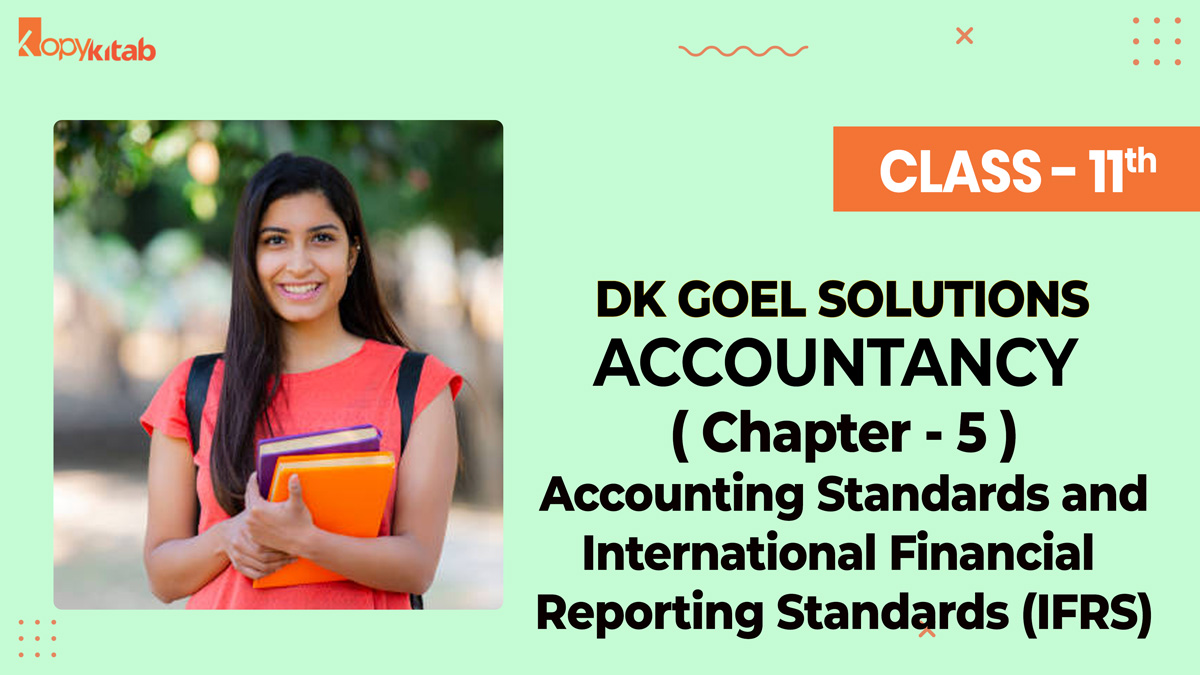
DK Goel Solutions Class 11 Accountancy Chapter 5 Accounting Standards and International Financial Reporting Standards (IFRS):Class 11 Accountancy students can practice questions from DK Goel Solutions Class 11 Accountancy Chapter 5. You will find accurate and credible solutions in DK Goel Solutions Class 11 Accountancy Chapter 5 Accounting Standards and International Financial Reporting Standards (IFRS). All these solutions are as per the current CBSE Syllabus.
Download the Free PDF of DK Goel Solutions Class 11 Accountancy Chapter 5 Accounting Standards and International Financial Reporting Standards (IFRS) using the link given in the blog. To know more, read the whole blog.
Download DK Goel Solutions Class 11 Accountancy Chapter 5 Accounting Standards and International Financial Reporting Standards (IFRS) PDF
Access Solutions Of DK Goel Solutions Class 11 Accountancy Chapter 5 Accounting Standards and International Financial Reporting Standards (IFRS)
Short Questions
Question 1
Define accounting standards.
Answer- These are written statements specifying uniform rules and practices for preparing the financial statement.
Question 2
Give two points regarding the nature of accounting standards.
Answer- The two nature of accounting standards are
(i) They define the accounting policies norms and indicates how transactions should be registered
(ii) They remove the effect of diverse accounting policies
Question 3
Give two advantages of accounting standards.
Answer- The two advantages of accounting standards are
(i) Accounting standard ensures the consistency and comparability of financial statements.
(ii) Accounting standard improves the reliability and credibility of financial statement
Question 4
State the objectives of an accounting standard.
Answer- The objectives of an accounting standard are.
- To guarantee evenness in the development and display of financial statements.
- To provide data to the users about the policies used in the formation of a financial statement
- To eliminate the effect of diverse accounting policies and practices.
- To guarantee uniformity, clarity, and comparability of financial statement
- To enhance the safety and of financial statement
Question 5
Define International Financial Reporting Standards (IFRS).
Answer- International Financial Reporting Standards (IFRS) is defined as a common set rule that helps financial statements to be uniform, clear and similar across the globe. IFRS rules are published by the International Accounting Standards Board (IASB). They designate how a business should manage and record its accounts.
Question 6
What are the two basic objectives of having an accounting standard?
Answer- The two basic objectives of having an accounting standard are.
(i) To ensure uniformity in accounting practices
(ii) To ensure transparency, consistency, and comparability.
Question 7
Why is accounting standard required?
Answer- Accounting standard is required to improve reliability and bring uniformity in the accounting process.
Question 8
What is the full form of IFRS?
Answer- The full form of IFRS is the International Financial Reporting Standards
Question 9
Which values are followed by adopting the accounting standards?
Answer- The values followed by adopting the accounting standards are the value of transparency, the value of consistency, the value of comparability, and the value of reliability
Question 10
Why International Financial Reporting Standards (IFRS) is important.
Answer– Few points that show that International Financial Reporting Standards (IFRS) is important are.
- Easy Access to Global Capital Market- Investors are now open to investing in different countries and accessing the fund globally. However, foreign investor fully relies on IFRS based financial statement of the company. Hence, the financial statement prepared according to the IFRS rules helps the company to get the investor and raise the fund.
- Easy to Make Comparison- Foreign investors compare the statement based on the internationally accepted set of accounting goals.
- Uniformity in Financial Reporting- The IFRS rule brings evenness, comparability, and clarity.
- Difficult to engage in duplicity- In the traditional style of accounting it is easy to engage in duplicity, but, following IFRS it is extremely difficult to manipulate the account.
This is the complete blog on DK Goel Solutions Class 11 Accountancy Chapter 5 Accounting Standards and International Financial Reporting Standards (IFRS). To know more about the CBSE Class 11 Accountancy exam, ask in the comments.
FAQs on DK Goel Solutions Class 11 Accountancy Chapter 5 Accounting Standards and International Financial Reporting Standards (IFRS)
From where can I find the download link for the DK Goel Solutions Class 11 Accountancy Chapter 5 Accounting Standards and International Financial Reporting Standards (IFRS) PDF?
You can find the download link of DK Goel Solutions Class 11 Accountancy Chapter 5 in the above blog.
How much does it cost to download the DK Goel Solutions Class 11 Accountancy Chapter 5 Accounting Standards and International Financial Reporting Standards (IFRS) PDF?
You can download DK Goel Solutions Class 11 Accountancy Chapter 5 Accounting Standards and International Financial Reporting Standards (IFRS) of Accounting for free.
Can I access the DK Goel Solutions Class 11 Accountancy Chapter 5 Accounting Standards and International Financial Reporting Standards (IFRS) PDF Offline?
Once you have downloaded the DK Goel Solutions Class 11 Accountancy Chapter 5 Accounting Standards and International Financial Reporting Standards (IFRS) PDF online, you can access it offline whenever you want.
Is the DK Goel Solutions Class 11 Accountancy Chapter 5 Accounting Standards and International Financial Reporting Standards (IFRS) a credible source for Class 11 Accountancy exam preparation?
Yes, the solutions of DK Goel Solutions Class 11 Accountancy Chapter 5 Accounting Standards and International Financial Reporting Standards (IFRS) are prepared by the subject matter experts, hence credible.
What are the objectives of an accounting standard?
The objectives of an accounting standard are.
To guarantee evenness in the development and display of financial statements.
To provide data to the users about the policies used in the formation of a financial statement
To eliminate the effect of diverse accounting policies and practices.
To guarantee uniformity, clarity, and comparability of financial statement
To enhance the safety and of financial statement
